Today we’re taking you behind the scenes to some of the Tibetan Buddhist nunneries supported through the Tibetan Nuns Project. You’ll see what the Tibetan Buddhist nuns eat and how they prepare their food.
Scroll down to the bottom of this post for delicious Tibetan vegetarian recipes.
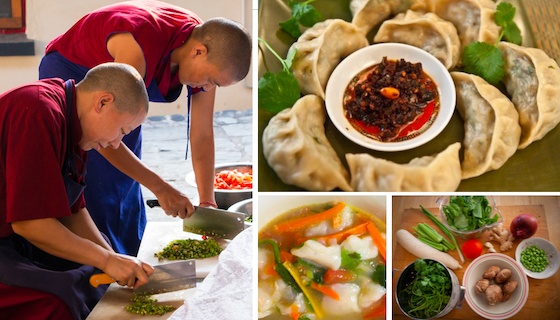
A collage of food photos from the Tibetan Buddhist nuns, including vegetarian Tibetan momos, top right. The photo on the left is courtesy of Dustin Kujawski. The photo of Tibetan momos in the top right is courtesy of YoWangdu.
The nunneries in India follow a simple vegetarian diet. The nuns’ diet is influenced by Indian food and local ingredients. With your support, their nutrition has greatly improved over the years.
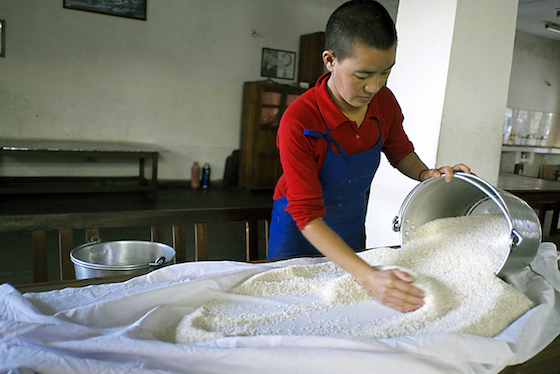
A nun on kitchen duty checks rice. Photo courtesy of Brian Harris
At Dolma Ling Nunnery and Institute, a typical breakfast might be a piece of flatbread, some cooked mixed vegetables, and tea. Lunch is the main meal of the day and is often rice, two kinds of vegetables, dal, and sometimes fruit. Dinner is often a noodle soup and maybe a steamed bun.
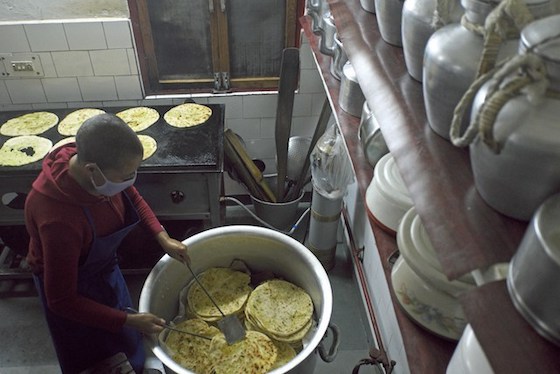
The nuns on kitchen duty at Dolma Ling Nunnery and Institute rise just past 3 a.m. to start preparing breakfast for the over 280 nuns and staff at the nunnery. In this photo by Brian Harris, a nun is making Indian-style flatbreads on a griddle.
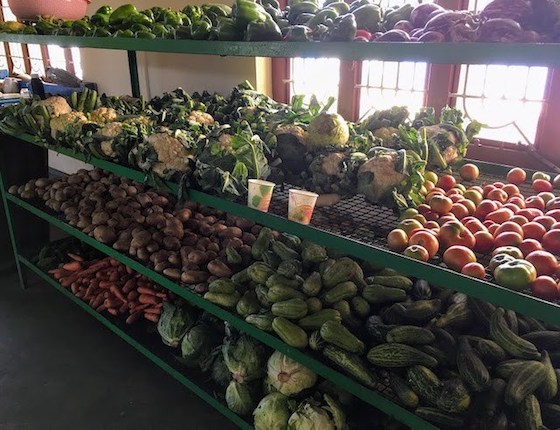
It takes a lot of vegetables to feed about 250 nuns. A few years ago, the kitchen at Dolma Ling was expanded and this new storage room was built. It is designed to keep birds and animals out and has a special chopping area.
For 2,500 years, since the time of the Buddha, it has been considered an act of merit to give food to monks and nuns. As Milarepa, the great Tibetan yogi and poet, said, “The practitioner and benefactor offering food create the cause to achieve enlightenment together.”
In the seven nunneries in northern India supported by the Tibetan Nuns Project, the nuns work together to prepare food for the entire nunnery. While the nunneries do their best to be self-sufficient, all of them are still heavily reliant for food support through our sponsorship program and through general donations.
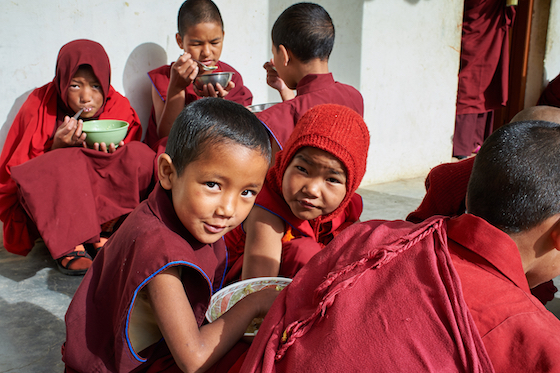
Young nuns at Sherab Choeling Nunnery in Spiti sit in the warm sun and eat. The nunnery is located in the remote, high-altitude region of Spiti in northern India. Photo courtesy of Olivier Adam
Good health and nutrition are essential for the nuns to be able to study. The majority of nuns came to India as refugees from Tibet and most arrived destitute, malnourished, and ill. As refugees without their families and traditional communities to support them, they rely more than ever on the compassion and generosity of others. Providing the nuns with a steady supply of nutritious food makes a dramatic difference in the energy they are able to devote to their studies.
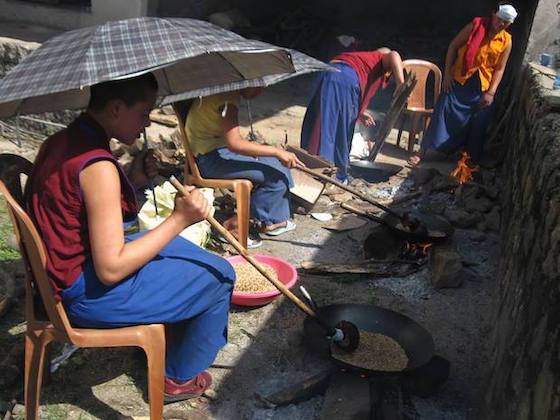
Tibetan Buddhist nuns at Shugsep Nunnery and Institute roast barley to make tsampa, the staple food of the Tibetan people. Once roasted, the barley is ground into flour and mixed with Tibetan tea for a high-energy meal.
Food at Remote Nunneries
The nuns in remote nunneries, such as Sherab Choeling Nunnery in Spiti and Dorjee Zong in Zanskar, have difficult living conditions. These two nunneries are located in high-altitude, arid regions where the growing season is short. The nuns face long, harsh winters and must stock up on supplies of food and cooking fuel well before the onset of cold weather.
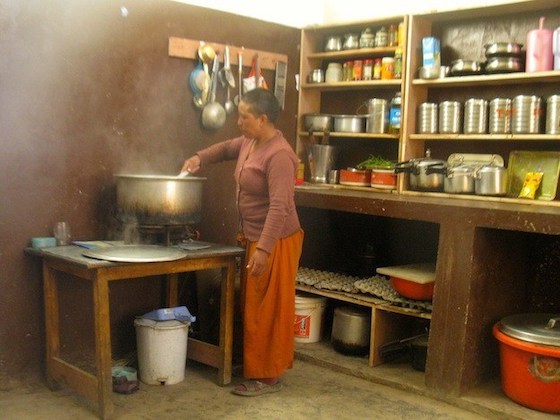
The simple kitchen at Sherab Choeling Nunnery is one of the warmest parts of the nunnery in winter. During the coldest months, the nuns hold their classes, prayers, and meetings in the kitchen because it is warmer and helps to save wood.
At Sherab Choeling Nunnery, the nuns work hard during the summer months to grow food for the long winter. During the summer, the nuns grow spinach, beans, peas, and wheat.
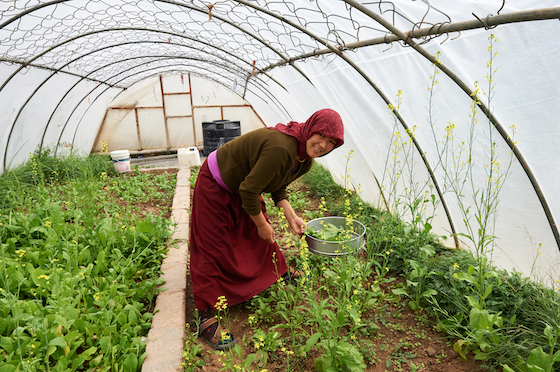
The nuns at Sherab Choeling Nunnery in Indian Himalayas have three greenhouses where they mostly grow spinach. Photo courtesy of Olivier Adam.
Vegetarian Recipes
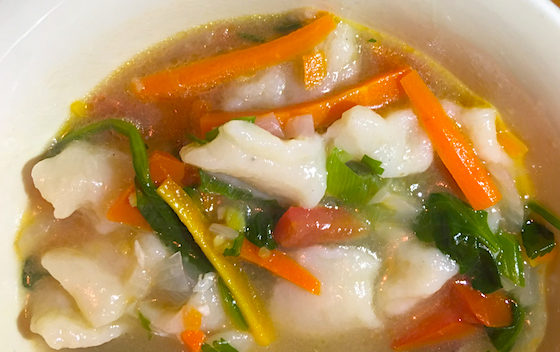
Tibetan noodle soup, thenthuk. This comfort food is a common noodle soup in Tibetan cuisine, especially in Amdo, Tibet.
Here are some recipes from past blog posts for typical dishes that the nuns eat.

Thank you for your work